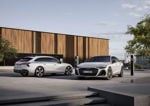As Fiat's global head of marketing and sales Juan Josè Diaz-Ruiz, said: 'If the European Commission has the interests of customers at heart, so have we. Why destroy a distribution system that is the most efficient, delivers the highest value, and is the most sophisticated compared to any other distribution system?
'Any change must be to the benefit of the customer, and improve efficiency and progress in our industry.'
Last month the European Parliament heated the debate over the future of the car distribution block exemption, with a hearing of its Economic and Monetary Policy Committee.
This prompted car manufacturers to defend strongly the current block exemption at the Frankfurt International Motor Show, their more aggressive approach indicating genuine concerns that the European Commission could refuse to renew the exemption when it expires at the end of September 2002.
EC competition commissioner Mario Monti has established himself as a consumer 'champion' prepared to confront big business head-on, recently rejecting the multi-billion dollar take-over of Honeywell by General Electric.
Reviewing car distribution in Europe, Monti has already expressed his dismay and disapproval at a system where he claims car manufacturers wield too much power over their dealers, to the detriment of consumers.
In particular, he has argued that the current block exemption (renewed in 1995) has failed to strengthen dealers' independence from manufacturers; failed to improve the internal market and promote parallel trade; failed to improve the competitive position of independent repairers; and failed to improve access for spare part manufacturers to sell directly to dealers.
He has also questioned whether there is effective competition in the motor industry - both between manufacturers and between dealers with the same franchise - whether dealers must provide aftersales support; and whether dealers are essential for vehicle repairs.
While accepting that a new block exemption is likely to introduce new distribution, retailing and aftersales systems, car makers are keen that key elements of the current regime continue.
Nick Reilly, General Motors Europe vice-president sales and marketing, said: 'Our concern is not so much the legislation - it's to ensure we have a regime that can still provide the services that customers want, and that we can provide our brand to customers in a way that we want.'
Two issues in particular lie at the heart of the debate - manufacturers' control and even ownership of their dealers, and the link between sales and servicing at a dealer.
In the UK, Mercedes-Benz has taken the radical step of terminating its dealer franchises and buying showroom outlets in key sales areas.
Other manufacturers, however, are starting to buy retail premises, but install independent entrepreneurial dealers to run them.
These co-ownership arrangements are practical rather than strategic in nature, and manufacturers appear ready to accept a certain weakening of the territorial exclusivity granted to dealers. In many respects exclusivity is already an anachronism in the internet age where dealers can advertise globally in cyberspace.
As Francois Hinfray, Renault director general, said: 'Territorial exclusivity in large cities is now impossible to implement. In principle you should not advertise outside your territory, so how can a dealer advertise in a city? But around this central system you could have complementary channels such as e-commerce or direct business with the help of dealerships.'
But if dealer shareholding and territorial exclusivity are no longer sacrosanct, manufacturers are fighting tooth and nail to sustain the direct and enforced links between sales and servicing.
Renault's Hinfray argues strongly that the sales and servicing link is important first for the profitability of dealers, and secondly to ensure customers receive the highest levels of service.
'If you are a multi-brand servicing outlet you cannot invest in training for every make and model, but new cars are very complex and that requires long and intensive training. How could you be trained for Renault, GM, Ford and Citroen cars - it's impossible? If we went this way we would regret it because customers would suffer,' he said.
He insists this is a safety and environmental issue, with trained, skilled brand-specific mechanics required to ensure vehicles are maintained as safely and as environmentally as possible.
At rival French manufacturer Citroen, managing director Claude Satinet defended the right for manufacturers to insist their dealers offer servicing, saying: 'The customer is not obliged to go to a dealer for aftersales, but he can if he wants, so I do not understand the objections of the EC. We are only asking for the power to oblige dealers to provide aftersales.'
Highlighting that the German government has already suggested that block exemption remain unchanged, Ford of Britain chairman and managing director Ian McAllister added: 'Our position is if you want to maintain standards for maintenance and quality criteria, you need the system and to avoid its complete collapse, you need geographical locations.'
McAllister added that sales and services 'should also be linked' saying that dealers need a high training budget and must also invest in diagnostic tools.
One compromise would be an arrangement where a franchised dealer has to offer servicing facilities, but not necessarily at the same premises as its new car showroom.
This would allow the establishment of servicing facilities in cheaper properties, that customers need never visit in person thanks to collection and delivery services and courtesy cars.
In Germany, Audi and Volkswagen have already established a number of service-only outlets, although in the UK, Audi director Kevin Rose said such an arrangement would be 'less appealing from a customer's perspective because they want a relationship with the original supplying dealer.'
The debate over the future of the block exemption is likely to continue for much time to come, but John Parkinson, sales and marketing director of MG Rover, made a telling point.
'The two largest car markets in the world, Japan and the United States, have never had a block exemption, but their distribution system is very similar to ours,' he said. (October 2001)
















Login to comment
Comments
No comments have been made yet.